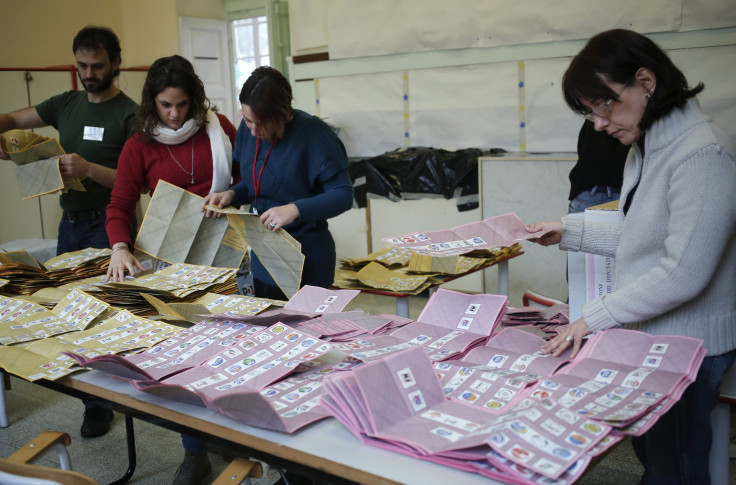Italy Elections 2013: Surprise Surge By Berlusconi Produces Tie, New Vote Likely

Italy may have to vote again soon after the election held Sunday and Monday failed to produce a clear majority. With the official voting tally almost complete, it appeared clear early Tuesday, local time, that while the center-left coalition has a clear majority in the lower house, there cannot be a majority in the Senate unless parties agree to form an unlikely "grand coalition."
Early projections had indicated a victory for Pier Luigi Bersani's center-left coalition, possibly in an alliance with outgoing Prime Minister Mario Monti’s party, but when the official numbers began to come in, it appeared clear that the euro zone's third-biggest economy was headed for political deadlock.
A late surge by former Prime Minister Silvio Berlusconi's People of Freedom center-right coalition, and a surprising showing by comedian Beppe Grillo protest-minded Five Star Movement, eroded the center-left's advantage in the polls, which had been as high as 10 percentage points in late 2012.
“The worst is still to come for Italy,” commented Gianfranco Fini, the outgoing speaker of the House. The onetime neo-Fascist headed a small party that fared poorly as part of a centrist coalition headed by Monti, which got 10 per cent of the vote.
With 96 per cent of the vote tallied, the center-left coalition led by the Democratic Party has 29.77 percent of the vote in the House and 31.71 in the Senate, a plurality in both cases, beating Berlusconi’s coalition, which garnered 28.95 per cent in the House and 30.64 percent in the Senate.
Grillo’s Five Star Movement, which wants Italy to leave the euro, possibly default on its debt, and pay a salary to the unemployed, obtained more than 25 per cent of the vote in the House, becoming Italy’s biggest single party. The M5S, as it is known in Italian, has no chance to be a part of government, since Grillo has said it will not be part of any coalition. But its success shows the deep malaise that has pushed many Italians to vote for a raucous comedian who uses unprintable language in his rallies and promises to “clean up” what his supporters call “the caste of politicians.”
Italian electoral law gives extra seats in the House and Senate to the coalition that wins a plurality. The Democratic Party and its left-wing ally SEL, forming the center-left coalition, would therefore have a guaranteed 340 seats in the House (the majority is 315), enough to govern comfortably for the next five years.
But in the Senate things would be different. Because Senate seats are assigned on a regional basis, and Berlusconi won pluralities in most of Italy’s more populous regions, the center-left’s plurality does not translate to a majority of seats.
According to a projection by Italian network Sky Tg24, Bersani's center-left would have 119 Senate seats to 110 for Berlusconi, 19 for Monti’s Scelta Civica (Civic Choice) paty, and 56 for Grillo’s M5S. No party or likely coalition would attain the 158 seats needed for a majority.
That means legislative gridlock and the likely need for new elections, since both chambers of Italy’s parliament have equal say in the legislative process (much like the House and Senate do in the U.S. political system – but without a president wielding executive power.)
Turnout was high compared to most Western democracies, at 75 per cent, but was lower than in the previous election in 2008, when 80 per cent of eligible voters showed up at the polls.
Berlusconi made a surprisingly strong showing, after he resigned in disgrace from the prime minister’s office in November 2011 amid a financial crisis and allegations of personal misconduct. Berlusconi is currently a defendant in a trial focusing on his infamous “bunga bunga” parties, in which he is accused of paying a minor for sex and abusing his power to spring her from jail.
None of these misadventures hurt Berlusconi in the polls. The 77-year old four-time prime minister, the longest-serving head of government in postwar Italian history, may in fact owe his stunning result to a pledge he made to return money paid by Italians in 2012 under an unpopular tax on homeowners called IMU, which Monti pushed through.
Voters got a letter from Berlusconi promising that, if elected, he would return to them the 4 billion euros the government took in thanks to the IMU. Economists widely dismissed that claim as unrealistic, but the promise may have produced its desired effect on Italians tired of sacrifices to shore up public finances.
The early prospect of a relatively solid center-left majority that would continue reforms supported by the European Union was welcomed by financial markets.
As early results came in, the Milan stock exchange’s FTSE MIB index gained almost 3 percent, indicating the market was betting on a stable government rather than the shaky, short-lived coalitions that have been the norm in postwar Italy. Later, as projections seemed to indicate a smaller than originally reported victory for the center-left, and possibly even gridlock, Italian stocks pared gains; the FTSE MIB index ended the day with a 118-pont rise (+0.7 per cent).
In a note emailed before the Berlusconi surge became apparent, research company Capital Economics summed up well the mood of the markets, saying that the numbers "suggest that the worst possible outcome of a long period of political deadlock has been avoided. Note too that Bersani is committed to meeting Italy’s existing fiscal goals and implementing further structural reforms."
Instead, that political deadlock seems now precisely what will happen.
Claudio Forleo and Valentina Beli of the IBTimes Italian edition contributed reporting for this story.
© Copyright IBTimes 2025. All rights reserved.






















